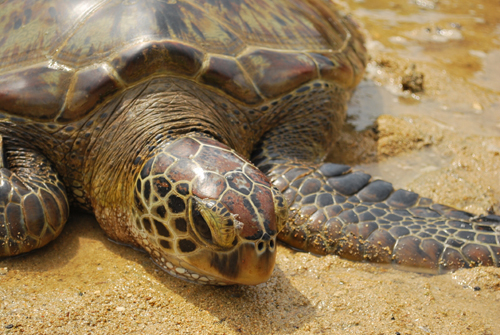Its cover shows a sea turtle, but a new book on climate change effects has U of G stamped all over it.
Four of the five co-authors of Climate Change Biology are Guelph professors − three from the Ontario Agricultural College and one from the College of Social and Applied Human Sciences.
The book will be published this month by CABI (Centre for Agricultural Bioscience International), a not-for-profit development organization based in the United Kingdom.
As one of few textbooks in a young but rapidly growing field, the new volume covers likely impacts of climate change on the natural world. Those effects include changes in where plants and animals live and changes in how nutrients move through the environment, says Prof. Jonathan Newman, director of the School of Environmental Sciences (SES).
The book discusses those impacts rather than debate the climate change phenomenon itself. “We take it as read that climate change is happening,” says Newman, who studies effects of climate change on cereal aphids and temperate grasslands.
Besides Newman, co-authors include SES professors Madhur Anand and Shelley Hunt, and geography professor Ze’ev Gedalof. A fifth contributor is Hugh Henry, a biologist at the University of Western Ontario.
The book will become the text for a senior undergrad course at Guelph on climate change biology. The course has attracted about 100 students each fall. Plans are to double enrolment this coming fall. “It’s a topical issue that students want to learn about,” Newman says.
Among the volume’s topics are the following:
- tools for understanding climate change research (radiocarbon dating, paleoclimatology), climate modelling and how scientists study climate change impacts;
- the effects of changes in temperature, carbon dioxide and precipitation on individuals, populations and communities, and ecosystem processes;
- applications in agriculture, forests and biodiversity; and
- how climate change relates to other stresses (habitat loss, deforestation, pollution).
Other authors have written about climate change, but few have brought together these ideas in an academic publication, says Newman. “There hasn’t been a textbook in the field.”
CABI had invited U of G authors to write the book. Guelph researchers include dozens of ecologists, several studying climate change biology.
Anand, holder of the Canada Research Chair in Global Ecological Change, has studied forest ecology and modelling. “The University of Guelph has long been well-recognized for its strength in ecological and environmental sciences,” she says.
Gedalof, a biogeographer who has looked at long-term climate and forest dynamics, says the collaboration underlines the need to involve varied disciplines in addressing climate change.
Gedalof and Newman will speak at a symposium on Climate Change and Implications for Plant Science to be held on campus June 7 and 8.
